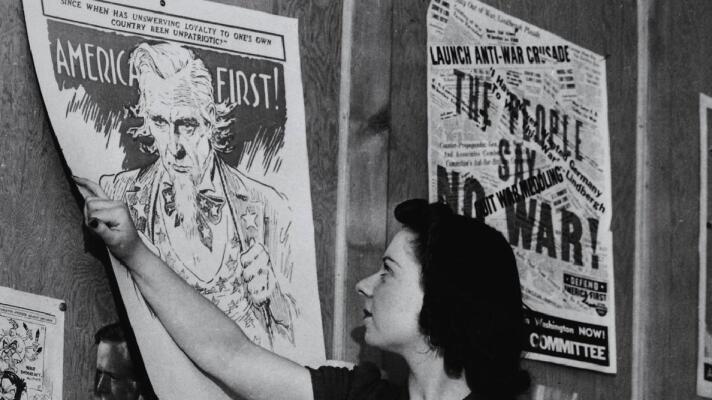Latest Episodes
Los Aliados liberan los campos Alemanes y el público ve la magnitud del Holocausto.
Episode:
S1
E6
|
2:10:51
En la guerra, algunos estadounidenses ayudan a los refugiados; otros son indiferentes.
Episode:
S1
E5
|
2:17:35
Una reacción xenófoba lleva al Congreso a restringir la inmigración.
Episode:
S1
E4
|
2:08:43
As the Allies liberate German camps, the public sees the sheer scale of the Holocaust.
Episode:
S1
E3
|
2:10:51
As war begins, some Americans work tirelessly to help refugees; others remain indifferent.
Episode:
S1
E2
|
2:17:35
Reversing open borders, a xenophobic backlash prompts Congress to restrict immigration.
Episode:
S1
E1
|
2:08:43
Specials
Filmmakers and special guests explore themes from the U.S. and the Holocaust.
Special:
1:03:34
Filmmakers and special guests explore themes from the U.S. and the Holocaust.
Special:
56:09
Extras
Asking what individuals can do when governments fail to act.
Clip:
1:47
Asking what it means to be a land of immigrants.
Clip:
2:04
Asking if the U.S. has a responsibility to intervene in humanitarian crises.
Clip:
2:31
Asking how we as a society can learn from the past.
Clip:
2:03
People assume every Jew died in a camp or gas chamber. But that’s only part of the story.
Clip:
S1
E3
|
3:49
It is impossible to tally how many thousands the board saved, directly or indirectly.
Clip:
S1
E3
|
5:59
Holocaust survivor Eva Geiringer reflects on life in Auschwitz.
Clip:
S1
E3
|
5:22
An attempt to save refugee children in the US hits antisemitism "so deep and so cruel."
Clip:
S1
E2
|
6:39
When the children finally arrived at Ellis Island, only their father greeted them.
Clip:
S1
E2
|
7:03
Founded by a handful of students, it became the largest anti-war group in US history.
Clip:
S1
E2
|
5:31
By the early 1900s, many white Americans embraced a pseudo-science called eugenics.
Clip:
S1
E1
|
5:54
"Exclusion of people, and shutting them out, has been as American as apple pie."
Preview:
0:30
"We're challenged to think of what we would have done..." Premieres September 18.
Preview:
0:30
'It is our neighbors that are throwing the bricks and rocks through the window.'
Preview:
0:30
A tragedy for the world - a reckoning for our nation. Premieres Sept. 18.
Preview:
0:31
A story Americans have to reckon with. Premieres Sept. 18.
Preview:
0:31
'Just enjoy your carefree life while you can.'
Preview:
0:30
Co-director and producer Sarah Botstein on making U.S. and the Holocaust.
Preview:
0:30
Exploring America’s response to one of the greatest humanitarian crises in history.
Preview:
1:01
Co-director and producer Lynn Novick on making U.S. and the Holocaust
Preview:
0:30
Co-director and producer Ken Burns on making U.S. and the Holocaust.
Preview:
0:30
Burns, Novick and Botstein give the story behind their most important film to date.
Preview:
2:00
A story Americans have to reckon with. Premieres Sept. 18.
Preview:
0:31
"A Harrowing Must Watch" - critics agree The U.S. and the Holocaust must-watch TV.
Preview:
0:31
Lives turned upside down when Nazis came to power. But changes didn’t happen overnight.
Clip:
S1
E1
|
6:05
It wasn’t easy for journalists to report what was happening in Nazi Germany in the 1930s.
Clip:
S1
E1
|
5:43
Ken Burns on 'the most important film we've ever made'.
Preview:
0:26


































